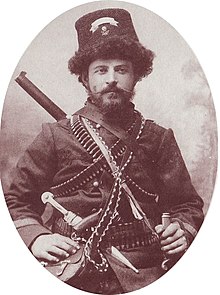Pitu Guli
Pitu Guli Питу Гули | |
|---|---|
 | |
| Born | 1865 |
| Died | 12 August 1903 (aged 37–38) |
| Monuments | Mečkin Kamen |
| Other names | Pitu the Vlach |
| Organization | |
Pitu Guli (Cyrillic: Питу Гули; 1865–1903) was an Aromanian revolutionary in Ottoman Macedonia, a local leader of what is commonly referred to as the Internal Macedonian Revolutionary Organization (IMRO).[1] Nevertheless, Pitu Guli and his family were Bulgarophiles.[2][3][4]
Life[]
Born to a poor family in Kruševo, he demonstrated an independent and rebellious nature early in life. He left his home in Macedonia at the age of 17 in search of wealth in the Bulgarian capital, Sofia. In 1885, he returned to Macedonia, as part of a rebel squad of the revolutionary movement against the Ottoman Empire, led by . He was captured and exiled to eastern Anatolia for a period of eight years, seven years of which were spent in the prison in Trabzon. In 1895, he again returned to Kruševo and became a member of IMARO. From this time on, he was fully committed to the autonomy of Macedonia from Turkish rule. Between 1897 and 1902 he was again in Sofia, where he also held an eating house.

In March 1903, he began commanding a revolutionary squad, crossing the Bulgarian-Ottoman border heading for Kruševo. From April to August 1903, he trained and prepared his irregulars for the upcoming Ilinden Uprising. He died in Kruševo, defending the Kruševo Republic.
Family[]
Following the revolt, Romania, with the support of Austro-Hungary, succeeded in the acceptance of the Aromanians ("Vlachs") as a separate millet with the decree (irade) of May 22, 1905 by Sultan Abdul Hamid II, so the Ullah Millet ("Vlach Millet", referring to the Aromanians) could have their own churches and schools.[5] Except for Bulgarian Exarchist Aromanians,[6] as Guli's family, most members of other ethnicities dismissed the IMRO as pro-Bulgarian.[7][8] Pitu is father of Tashko Gulev (Shula Guli), who died in 1913 as soldier of the Bulgarian Army in the battle of Bregalnica against the Serbs, during the Second Balkan War.[9] He is also father of the revolutionary of the IMRO, Nikola Gulev (Lakia Guli), one of the people closest to Todor Alexandrov. He was arrested by the police of Kingdom of Serbs, Croats and Slovenes and died in custody after being tortured in 1924.[10] Pitu Guli is a father of Steryo Gulev (Sterya Guli), who took part in the military units formed by the authorities in Vardar Macedonia during the Bulgarian administration in World War II, to fight the communist Yugoslav Partisans. He reportedly shot himself after Bulgaria switched sides and withdrew from Yugoslavia in 1944, upon the arrival of Tito's partisans in Kruševo, in despair over what he saw as a second period of Serbian dominance in Macedonia.[11]
Legacy[]
Pitu Guli is a national hero in North Macedonia and Bulgaria, and remembered as having fought heroically at Mečkin Kamen (Bear's Rock) near Kruševo, where he was killed during the Ilinden Uprising in defense of the Macedonian Kruševo Republic. A Macedonian Partisan Brigade was named after him. He is also celebrated in folk songs and poetry throughout the region of Macedonia, being mentioned in the national anthem of North Macedonia (Today over Macedonia).
References[]
| Wikimedia Commons has media related to Pitu Guli. |
- ^ Brown, K. (2003) The Past in Question: Modern Macedonia and the Uncertainties of Nation (Princeton: Princeton University Press) ISBN 0-691-09995-2
- ^ Коста Църнушанов, Македонизмът и съпротивата на Македония срещу него, Университетско изд. "Св. Климент Охридски", София, 1992, стр. 132.
- ^ Тодор Балкански, Даниела Андрей, Големите власи сред българите, Знак 94, ISBN 9548709082, 1996, стр. 60-70.
- ^ Thede Kahl, Istoria aromânilor, Biblioteca de istorie, Colecția Sens; Tritonic, 2006, ISBN 9737330412, p. 123.
- ^ Thede Kahl, Ethnologia Balkanica, Vol. 6 (2002), p. 148
- ^ Aromanian consciousness was not developed until the late 19th century, and was influenced by the rise of Romanian national movement. As result, wealthy, urbanized Ottoman Vlachs were culturally hellenised during 17-19th century and some of them bulgarized during the late 19th and early 20th. century. Raymond Detrez, 2014, Historical Dictionary of Bulgaria, Rowman & Littlefield, ISBN 1442241802, p. 520.
- ^ Andrew Rossos, Macedonia and the Macedonians: A History, Hoover Press, 2013, ISBN 081794883X,p. 105.
- ^ Philip Jowett, Armies of the Balkan Wars 1912–13: The priming charge for the Great War, Bloomsbury Publishing, 2012, ISBN 184908419X, p. 21.
- ^ Македоно-одринското опълчение 1912-1913 г. Личен състав, Главно управление на архивите, 2006, стр. 190.
- ^ Македонска енциклопедија, МАНУ, Скопје, 2009, стр. 415-416.
- ^ Historical Dictionary of the Republic of Macedonia, Dimitar Bechev, Scarecrow Press, 2009, ISBN 0810862956, p. 91.
- 1865 births
- 1903 deaths
- People from Kruševo
- Aromanian people
- Members of the Internal Macedonian Revolutionary Organization
- Bulgarian revolutionaries
- Prisoners and detainees of the Ottoman Empire
- Ottoman Kruševo
- Bulgarian people of Aromanian descent